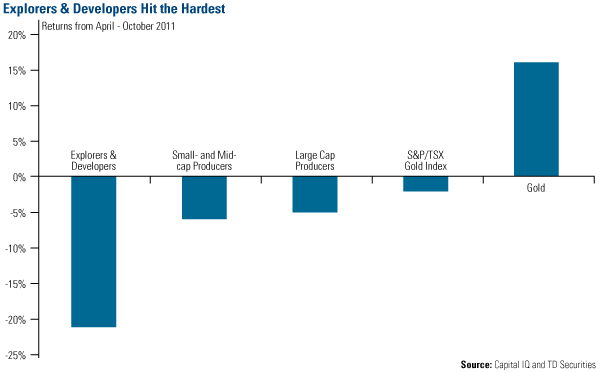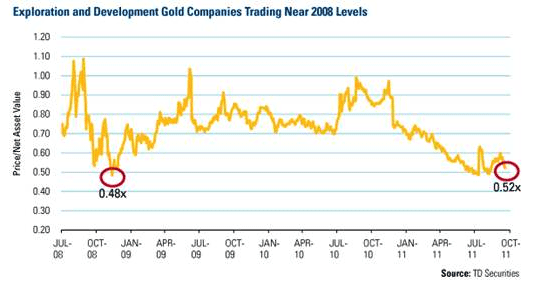If you have cash you want to speculate with...
http://www.321gold.com/editorials/holmes/holmes101811a.html
Which Gold Miners Have Largest Upside?
By Frank Holmes
CEO and Chief Investment Officer
U.S. Global Investors
Posted Oct 18, 2011
Since hitting $1,900 an ounce through the beginning of October, gold has declined nearly 11 percent. Over the same timeframe, the NYSE Arca Gold Miners Index lost almost 13 percent. That’s a closer performance correlation than the roughly 3-to-1 gold equities to bullion ratio we’ve historically seen and could mean the miners are finally closing the gap.
However, TD Securities Equity Research points out this interesting fact: Over a period of 18 months prior to hitting $1,900, gold rose 79 percent but TD’s basket of gold equities only increased 57 percent. The firm says this performance gap “ranks as the worst relative performance of gold equities to gold since 2001.” During the July through September period of 2008, TD Securities’ universe of gold equities declined 46 percent, while gold bullion only lost 24 percent. In October through November of 2008, the same gold equities lost 37 percent; while gold decreased 22 percent.
What’s behind today’s record disparity?
Part of it may be due to the underperformance of the explorers and developers, which, TD says, “have been hit the hardest.” The chart below shows gold miners by capitalization and their returns since April 2011. Explorers and developers have declined the most, losing 21 percent, small- and mid-cap producers have declined 6 percent and large producers lost 5 percent.

Because of the dramatic price decline in these early-stage companies, investors have the opportunity to purchase explorers & developers (E&D), often referred to as juniors, at about half of the company’s net asset value (NAV). In simplest terms, the NAV means assets minus liabilities. In fact, you can see from the chart that the current price-to-NAV level for E&D equities is sitting near record low levels…levels not seen since the financial crisis of 2008.

TD found that in seven of the past 10 rallies, gold equities beat gold - averaging a beta of 1.4 times. Looking over the next year or so, we believe the smaller gold miners are especially poised to outperform this time. As TD says, “on a rebound, we expect the best performing equities to be among the ranks of the explorers and developers.”
To gold equity buyers like U.S. Global, this represents a tremendous buying opportunity.
The NYSE Arca Gold Miners Index is a modified market capitalization weighted index comprised of publicly traded companies involved primarily in the mining for gold and silver. The index benchmark value was 500.0 at the close of trading on December 20, 2002. Beta is a measure of the volatility, or systematic risk, of a security or a portfolio in comparison to the market as a whole. The S&P/TSX Global Gold Index is an international benchmark tracking the world's leading gold companies with the intent to provide an investable representative index of publicly-traded international gold companies.
http://www.321gold.com/editorials/holmes/holmes101811a.html
Which Gold Miners Have Largest Upside?
By Frank Holmes
CEO and Chief Investment Officer
U.S. Global Investors
Posted Oct 18, 2011
Since hitting $1,900 an ounce through the beginning of October, gold has declined nearly 11 percent. Over the same timeframe, the NYSE Arca Gold Miners Index lost almost 13 percent. That’s a closer performance correlation than the roughly 3-to-1 gold equities to bullion ratio we’ve historically seen and could mean the miners are finally closing the gap.
However, TD Securities Equity Research points out this interesting fact: Over a period of 18 months prior to hitting $1,900, gold rose 79 percent but TD’s basket of gold equities only increased 57 percent. The firm says this performance gap “ranks as the worst relative performance of gold equities to gold since 2001.” During the July through September period of 2008, TD Securities’ universe of gold equities declined 46 percent, while gold bullion only lost 24 percent. In October through November of 2008, the same gold equities lost 37 percent; while gold decreased 22 percent.
What’s behind today’s record disparity?
Part of it may be due to the underperformance of the explorers and developers, which, TD says, “have been hit the hardest.” The chart below shows gold miners by capitalization and their returns since April 2011. Explorers and developers have declined the most, losing 21 percent, small- and mid-cap producers have declined 6 percent and large producers lost 5 percent.

Because of the dramatic price decline in these early-stage companies, investors have the opportunity to purchase explorers & developers (E&D), often referred to as juniors, at about half of the company’s net asset value (NAV). In simplest terms, the NAV means assets minus liabilities. In fact, you can see from the chart that the current price-to-NAV level for E&D equities is sitting near record low levels…levels not seen since the financial crisis of 2008.

TD found that in seven of the past 10 rallies, gold equities beat gold - averaging a beta of 1.4 times. Looking over the next year or so, we believe the smaller gold miners are especially poised to outperform this time. As TD says, “on a rebound, we expect the best performing equities to be among the ranks of the explorers and developers.”
To gold equity buyers like U.S. Global, this represents a tremendous buying opportunity.
The NYSE Arca Gold Miners Index is a modified market capitalization weighted index comprised of publicly traded companies involved primarily in the mining for gold and silver. The index benchmark value was 500.0 at the close of trading on December 20, 2002. Beta is a measure of the volatility, or systematic risk, of a security or a portfolio in comparison to the market as a whole. The S&P/TSX Global Gold Index is an international benchmark tracking the world's leading gold companies with the intent to provide an investable representative index of publicly-traded international gold companies.
